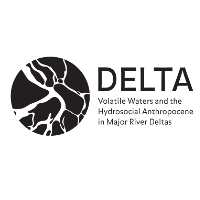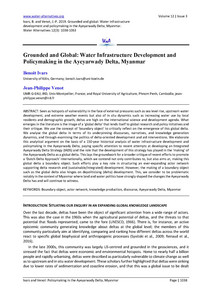The article, published in the journal Water Alternatives (www.water-alternatives.org) in October 2019, reviews the infrastructure development and policymaking in the Ayeyarwady Delta paying specific attention to recent attempts at developing an Integrated Ayeyarwady Delta Strategy (IADS) and the role that the development of this strategy has played in the 'making' of the Ayeyarwady Delta as a global delta.
We show that infrastructural development in the Ayeyarwady Delta follows similar paths than that of other deltas in Southeast Asia (flood control infrastructure and large-scale land reclamation projects notably). This is partly linked, we suggest, to the influence of various international knowledge brokers and large-scale studies which have partly shaped the development of the delta, although the country has been closed for most of the second half of the twentieth century.
In this publication, we also suggest that the Ayeyarwady Delta has more recently been enacted as what we call a “global delta”. Deltas are high on the development agenda and on the international science. It emerges notably from the literature the image of a “global delta”, that is, an entity of broader relevance that would lend itself – and even require – generic research and governance approaches and their critique. Making use of the concept of boundary object, we reflect on the emergence of this “global delta” in terms of discursive regimes, knowledge networks and brokers.
In Myanmar, since the opening of the country in 2011, the Ayeyarwady Delta became a new frontier for global development and delta planning. The Dutch development aid and water sector (consulting companies, higher education and research organizations) plays a key role through, for instance, the attempt to develop an Integrated Ayeyarwady Delta Strategy (IADS). The elaboration of a delta vision, and the identification of a strategy and series of measures to support it, contributes to the making of the Ayeyarwady Delta as a “global delta”. The setting-up of a supportive coalition of actors who can finance and implement some of these measures serve to establish the delta as a policy object, but also leads we argue to depoliticizing development. The malleability of the "global delta" indeed allows different actors to advance their agendas through, which in turn could affect the delta and its inhabitants. This we found to be problematic considering that land and water changes in the Ayeyarwady Delta have been and continue to be highly politicized.
You can access the full text at http://www.water-alternatives.org/index.php/alldoc/articles/vol12/v12issue3/554-a12-3-10/file

